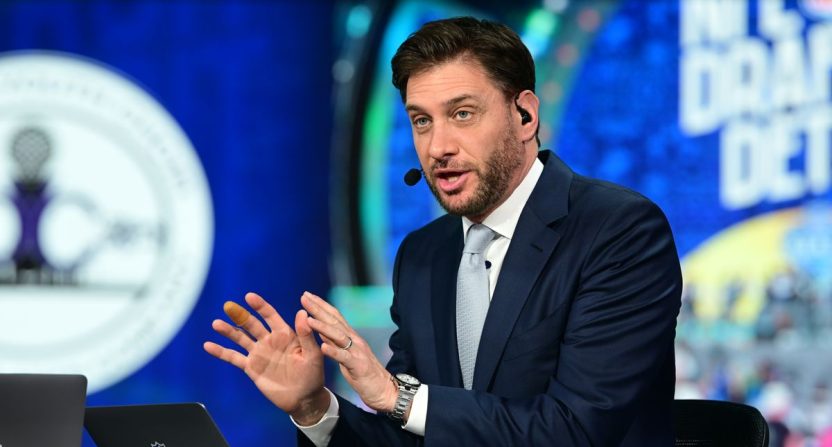Mike Greenberg has a great career as one of the faces of ESPN.
But even he knows the industry is evolving around him, and moving under his feet.
The move from cable to streaming is here for ESPN and the rest of the sports broadcasting business. There are more content options in all the areas Greenberg works. Whether that be a talk show, a pregame studio show, or a radio show, fans can look across many mediums and many hosts to watch what they want.
The Get Up host still isn’t worried.
In an interview on The Varsity podcast released this week, Greenberg explained his supreme confidence that the worldwide leader is “better positioned” than “anyone” for the streaming age.
“I can’t tell you where it’s all going. I don’t know,” Greenberg said. “[But] I think ESPN has positioned itself as well for whatever the new world is going to be, I think we are better positioned for that than anyone I can think of. Who is going to make the transition into whatever comes next better than we are? What is it that people are going to demand to have, no matter where it is they need to go to get it? Who is it they are going to want more than they are going to want ESPN, with all of the things that we have, all of the properties that we’ve acquired?”
In the afternoon timeslot on Greenberg’s network, Pat McAfee’s YouTube show is simulcast where SportsCenter used to be a cash cow. As the host of Sunday NFL Countdown, Greenberg completes directly with streaming-exclusive NFL pregame shows on NBC’s Peacock service.
Greenberg knows cable television is no longer a one-stop shop for sports content, but he also looks at the industry optimistically. All those content streams are good news for effective hosts like him.
“What I do have confidence in is that there will always be a place for people to create really good, smart programming,” Greenberg told host John Ourand. “I believe that people like me who create content, there will always be a market for that. And whether people consume it the way they’re currently consuming it or however we transition to however they’re going to be consuming it in the future, I have great confidence that there will always be that demand. In fact, I feel like there is more demand for it now than there has ever been.”
Of course, we already know ESPN’s plans to keep up with this evolving world. Next fall, it will launch its direct-to-consumer service — currently nicknamed “Flagship.”
Greenberg started on local television and radio in Chicago and already has seen the media world change since the 1990s. And despite claiming recently that sports radio would be around for a “long time,” he is not shy about embracing the move to a streaming-only world, whenever that day comes. In fact, he doesn’t think his job will change much if at all.
“If and when there comes a time when that is no longer on the television … so be it,” Greenberg said. “I’ll go wherever the people are … I don’t think that the show I do, if all of a sudden people are consuming it in a different way or on a different platform, I don’t think it has to be all that different than the show I’m doing now.”
Being a flexible company man works great for Greenberg. He’s not about to start being fussy now.
Still, his claim that ESPN is in as good a position as any network has little to do with its talent or studio shows. The best case to back up Greenberg’s claim is that between the NFL, NBA, college football, college basketball and many women’s sports, sports fans need ESPN.
If fans want to watch the biggest sports in the 2030s, they will have to pay money to Greenberg’s employer.
